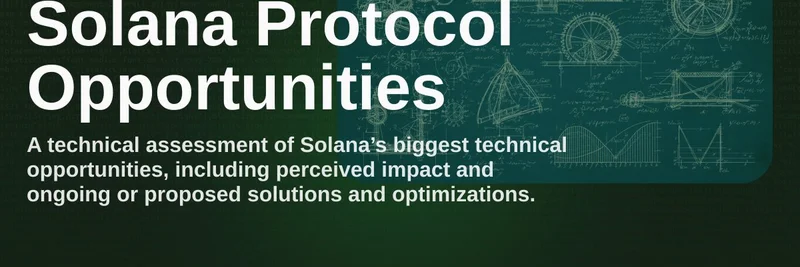RockawayX Shines a Light on Solana's Next Big Moves
Hey there, meme enthusiasts and blockchain buffs! If you're deep into the Solana ecosystem—like trading those viral meme tokens on platforms such as Pump.fun or Jupiter—you know how crucial network performance is. A recent tweet from RockawayX (view the tweet here) caught our eye, highlighting that even after a historic week for crypto, Solana still has massive technical opportunities at the protocol level. They dropped a comprehensive report breaking down these chances for improvement, complete with their potential impacts and the solutions already in the works or proposed.
As someone who's been around the block in crypto journalism, I can tell you this isn't just tech jargon—it's the stuff that could make or break your next meme coin pump. Let's break it down in plain English, focusing on how these upgrades could level up the meme token game on Solana.
Tackling Validator Challenges: Cheaper and More Efficient Operations
Validators are the backbone of Solana, keeping the network secure and processing your transactions. But right now, they're dealing with some hefty issues that trickle down to everyone using the chain.
First up, transaction duplication and flooding. Picture this: during a hot meme token launch, bots spam the network with identical transactions, clogging things up and slowing down validators. This wastes resources and jacks up hardware needs, making it tougher for smaller players to join in.
The report points to solutions like Stake-Weighted Quality of Service (SWQoS), which gives priority to transactions from validators with more stake, cutting down on spam. There's also DoubleZero Filtering, a smart way to nip duplicates in the bud before they spread. Combining these could seriously boost network stability, meaning fewer delays when you're trying to snag that next 100x meme.
Then there's the cost factor. Running a validator isn't cheap—vote transactions alone can cost about 1.08 SOL per day, plus pricey hardware. This centralizes power in bigger hands, which isn't great for decentralization. Enter SIMD-0096, which funnels all priority fees back to validators, and Alpenglow optimizations like BLS Signature Aggregation. This tech aggregates votes to slash fees dramatically, potentially down to single-digit SOL annually. Rotating voting committees would also lighten the load by having only a subset of validators vote at a time.
For meme token folks, this means a more decentralized Solana, reducing the risk of outages that could crash a hype cycle. Plus, lower costs could attract more validators, making the network tougher against attacks.
Client diversity is another biggie. Solana's mostly run on one client right now, which is risky—if a bug hits, the whole network could go down, as we've seen in past outages. Solutions include rolling out multiple clients like Firedancer (super fast, over 1M TPS), Sig, and Mithril. The Solana Foundation is pushing for this by requiring testnet validators to use hybrids like Frankendancer.
In the meme world, this resilience means your trades go through even during peak frenzy, without the network grinding to a halt.
Enhancing the End-User Experience: Faster, Smoother Transactions
As an end user—whether you're flipping memes or just holding SOL—the pain points are clear: congestion, unreliable RPCs, and latency that feels like forever in crypto time.
Congestion happens when blocks fill up fast, especially with vote transactions eating 10% of space. Alpenglow aims to fix this by aggregating votes off-chain and using committees, freeing up room for more user transactions. Pair that with bigger block capacities via high-perf clients, and we're talking serious throughput gains.
Unreliable RPC responses? About 12% fail silently during busy times, and latency spikes due to geography. The fix: a programmable RPC layer with smart routing and load balancing, plus upgrades in Agave v3.0 for snappier real-time updates.
Latency and finality are key for memes— you want sub-second confirmations to outpace the competition. Current 400ms block times and 12s finality lag behind rivals. Alpenglow's microsliced blocks, single-hop broadcasts, and two-round finality using BLS could drop this to under a second.
Looking ahead, Anatoly Yakovenko's "endgame" vision includes concurrent leaders, shorter slots (120ms), and asynchronous execution to hit insane TPS levels. This could make Solana rival centralized exchanges, perfect for the high-speed world of meme trading where every millisecond counts.
Empowering Developers: Easier Building for Meme Innovation
Developers building meme platforms or dApps on Solana face a steep curve with Rust and parallel execution. But tools like Anchor (a framework for simpler smart contracts) and SPL libraries are smoothing that out, along with better testing and education resources.
Verification is spotty—many top dApps aren't verified, eroding trust. Tools for deterministic builds and Foundation pushes for open-sourcing are changing that.
For the meme scene, easier dev tools mean more innovative platforms, faster iterations on things like automated market makers or launchpads, ultimately giving us more fun (and profitable) meme tokens to play with.
Wrapping It Up: Solana's Path to Meme Dominance
RockawayX's report (read the full thing here) is a wake-up call that Solana's not done evolving. By addressing these protocol opportunities, the network could become even faster, cheaper, and more reliable—music to the ears of meme token traders who thrive on speed and low fees.
If you're in the Solana meme game, keep an eye on these upgrades; they could be the rocket fuel for the next bull run. What do you think—will Alpenglow be the game-changer? Drop your thoughts in the comments!


